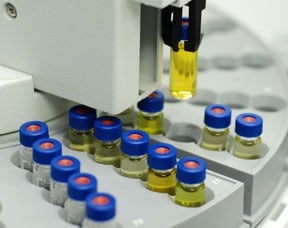Early diagnosis is key to effectively treat prostate cancer and as a result researchers are always trying new methods to identifying prostate cancer at its earliest stages. Researchers from the University of Liverpool in collaboration with the University of West England’s (UWE) Urological Institute team at Southmead Hospital and Bristol Royal Infirmary have created a new diagnostic test for prostate cancer that could potentially eliminate the need for invasive diagnostic procedures. Researchers worked on a pilot study which included 155 men presenting to urology clinics. Of this group, 58 were diagnosed with prostate cancer, 24 with bladder cancer and 73 with haematuria or poor stream without cancer.
The research team used a gas chromatography sensor system called an Odoreader that was developed by a team led by Professor Probert and Professor Norman Ratcliffe at UWE Bristol. The test involves inserting urine samples into the Odoreader that are then measured using algorithms developed by the research team at the University of Liverpool and UWE Bristol. The machine analyses the odor of urine samples using a 30m column.
This allows the compounds in the urine to travel through at different rates, allowing the machine to break the sample into a readable format. The machine then translates the results into an algorithm, which enabled the detection of cancer by reading the patterns presented and researchers also found that the GC sensor system had a 95 percent accuracy in identifying the different cancers.
In a press release from the University of Liverpool’s Institute of Translational medicine lead researcher Professor Chris Probert stated,
“There is an urgent need to identify these cancers at an earlier stage when they are more treatable as the earlier a person is diagnosed the better. After further sample testing, the next step is to take this technology and put it into a user-friendly format. With help from industry partners, we will be able to further develop the Odoreader, which will enable it to be used where it is needed most: at a patient’s bedside, in a doctor’s surgery, or in a clinic or a walk-in center, providing fast, inexpensive, accurate results.”
Professor Norman Ratcliffe further explained that there is currently no accurate test for prostate cancer, and that Prostate-specific antigen (PSA) test indicators are vague at best, and can sometimes result in unnecessary biopsies. He further stated,
“Our aim is to create a test that avoids this procedure at initial diagnosis by detecting cancer in a non-invasive way by smelling the disease in men’s urine. A few years ago we did similar work to detect bladder cancer following a discovery that dogs could sniff out cancer. We have been using the Odoreader, which is like an electronic nose to sense the cancer.”
The pilot trial was funded by the Rotary Club in Bristol who held annual Run for the Future events in Bristol. Findings for the research were published in the Journal of Breath Research, which describes it as a diagnostic test using a special tool to ‘smell’ the cancer in men’s urine.


